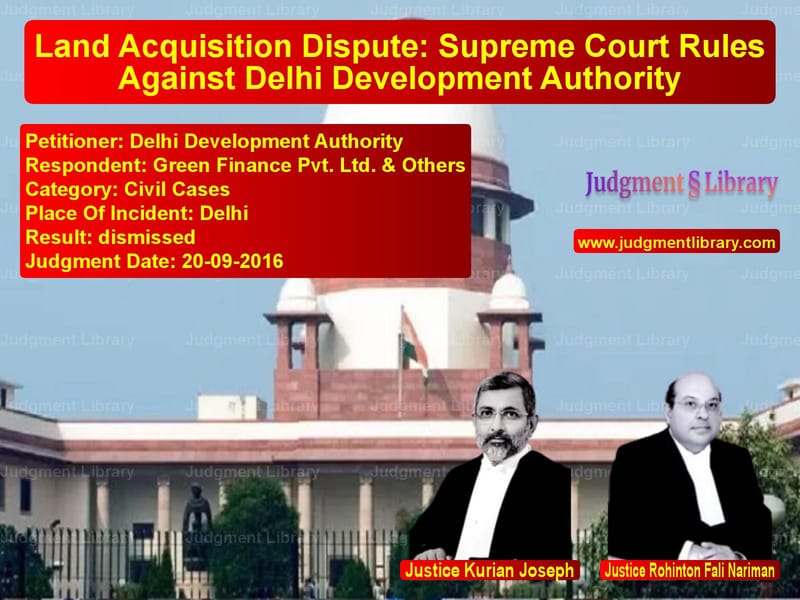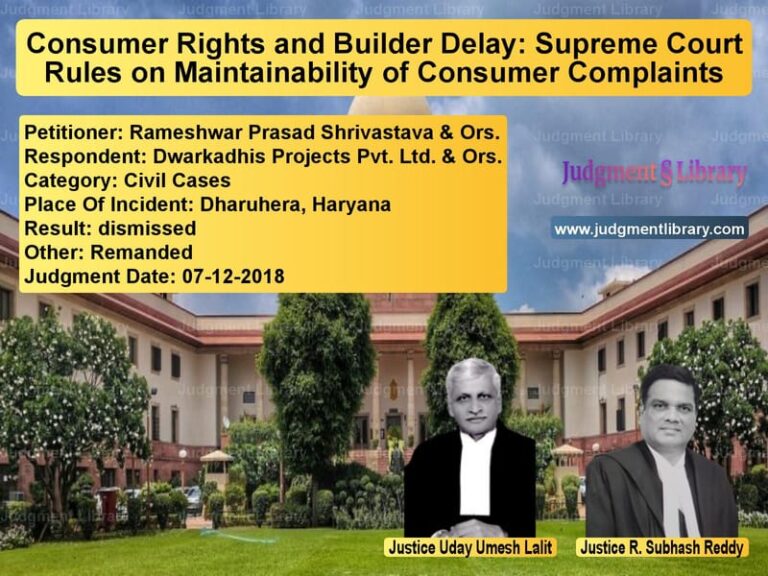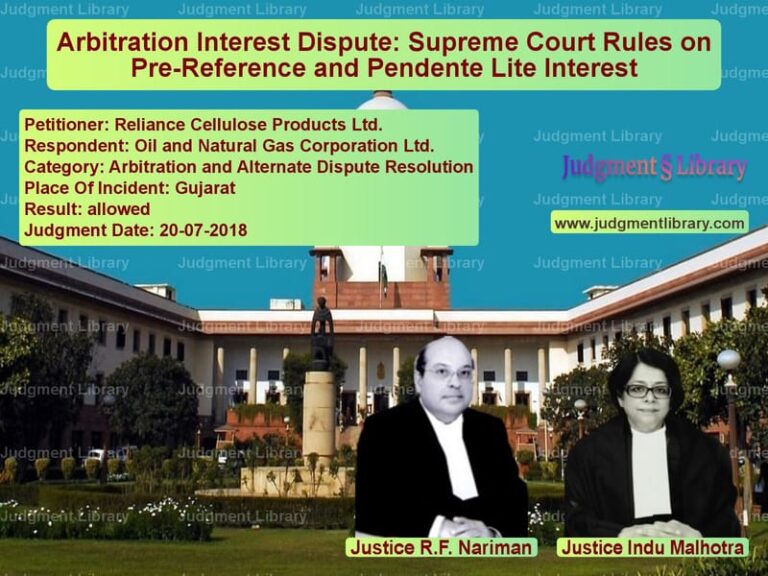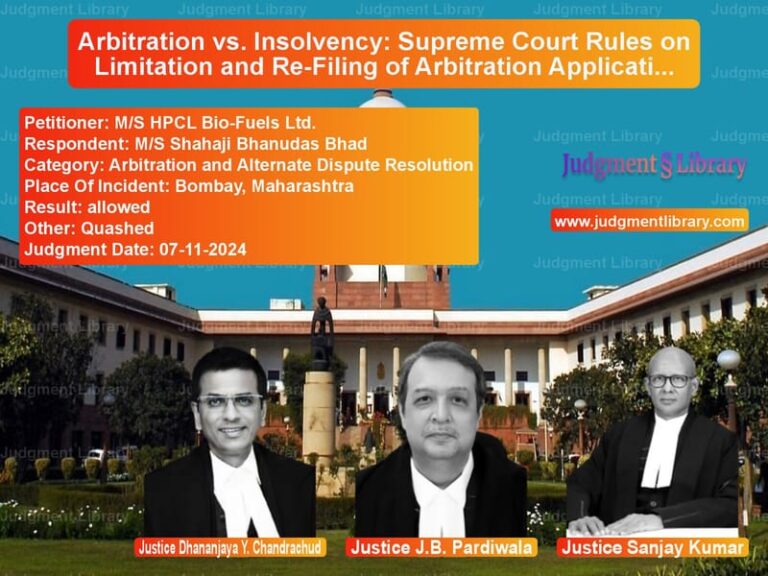Land Acquisition Dispute: Supreme Court Rules Against Delhi Development Authority
The Supreme Court of India recently ruled in the case of Delhi Development Authority (DDA) vs. Green Finance Pvt. Ltd. & Others, dealing with land acquisition and compensation under the Right to Fair Compensation and Transparency in Land Acquisition, Rehabilitation, and Resettlement Act, 2013. This judgment addressed the government’s failure to complete the acquisition process within the mandated timeframe, raising significant questions about the accountability of authorities in acquiring private land.
Background of the Case
The Delhi Development Authority (DDA) had attempted to acquire land under the old Land Acquisition Act, 1894. However, the respondents, led by Green Finance Pvt. Ltd., challenged the acquisition, arguing that they were entitled to either receive fair compensation or reclaim their land under the provisions of the 2013 Land Acquisition Act.
The core issue in this case revolved around Section 24(2) of the 2013 Act, which states that if land acquired under the 1894 Act was neither taken into possession nor compensated within five years, the acquisition process lapses.
Legal Issues Raised
- Did the DDA lawfully take possession of the disputed land?
- Had the landowners received fair compensation?
- Should the acquisition be deemed invalid under the 2013 Act?
- Should the government return the land to the original owners if no fresh acquisition is initiated within a specific period?
Arguments Presented in Court
Arguments by the Appellant (Delhi Development Authority):
- The acquisition process was validly conducted under the 1894 Act.
- The land was essential for public development, and reversing the acquisition would negatively impact infrastructure projects.
- The delay was due to administrative reasons, which should not render the process void.
- The government should be allowed more time to finalize the acquisition.
Arguments by the Respondents (Green Finance Pvt. Ltd. & Others):
- The DDA had failed to take possession of the land within the time required under the 2013 Act.
- No compensation had been paid to the landowners, making the acquisition illegal.
- The acquisition process should be considered lapsed as per Section 24(2).
- The government could not indefinitely delay acquisition while depriving landowners of their property rights.
Supreme Court’s Observations
The Supreme Court referred to its earlier judgments in similar cases and stated:
“The issue, in principle, is covered against the appellant by judgments in Civil Appeal No. 8477 of 2016 arising out of Special Leave Petition (C) No. 8467 of 2015 and Civil Appeal No. 5811 of 2015 arising out of Special Leave Petition (C) No. 21545 of 2015.”
The Court reaffirmed the principle that if the government fails to take possession or pay compensation, the acquisition process is automatically deemed lapsed.
The Court further ruled:
“In the peculiar facts and circumstances of these cases, the appellant is given a period of one year to exercise its liberty granted under Section 24(2) of the Right to Fair Compensation and Transparency in Land Acquisition, Rehabilitation and Resettlement Act, 2013 for initiation of the acquisition proceedings afresh.”
The ruling made it clear that if the DDA failed to initiate fresh acquisition proceedings within one year, it must return the land to its rightful owners.
Final Judgment
The Supreme Court dismissed the appeals filed by the DDA and ruled:
“These appeals are, accordingly, dismissed.”
The Court also clarified:
“If no fresh acquisition proceedings are initiated within one year from today by issuing a Notification under Section 11 of the Act, the appellant, if in possession, shall return the physical possession of the land to the original landowner.”
Implications of the Judgment
The ruling has several important implications:
- Strengthening landowners’ rights: The decision ensures that landowners cannot be deprived of their land indefinitely.
- Government accountability: Authorities must ensure timely acquisition and compensation.
- Enforcing Section 24(2) of the 2013 Act: The case sets a precedent for similar disputes.
Conclusion
The Supreme Court’s ruling in DDA vs. Green Finance Pvt. Ltd. & Others upholds the principles of fairness and transparency in land acquisition. By affirming that the government cannot delay acquisition indefinitely, the judgment strengthens landowners’ rights and reinforces the legal framework for fair compensation.
Don’t miss out on the full details! Download the complete judgment in PDF format below and gain valuable insights instantly!
Download Judgment: Delhi Development Au vs Green Finance Pvt. L Supreme Court of India Judgment Dated 20-09-2016-1741883801007.pdf
Direct Downlaod Judgment: Direct downlaod this Judgment
See all petitions in Property Disputes
See all petitions in Judgment by Kurian Joseph
See all petitions in Judgment by Rohinton Fali Nariman
See all petitions in dismissed
See all petitions in supreme court of India judgments September 2016
See all petitions in 2016 judgments
See all posts in Civil Cases Category
See all allowed petitions in Civil Cases Category
See all Dismissed petitions in Civil Cases Category
See all partially allowed petitions in Civil Cases Category







